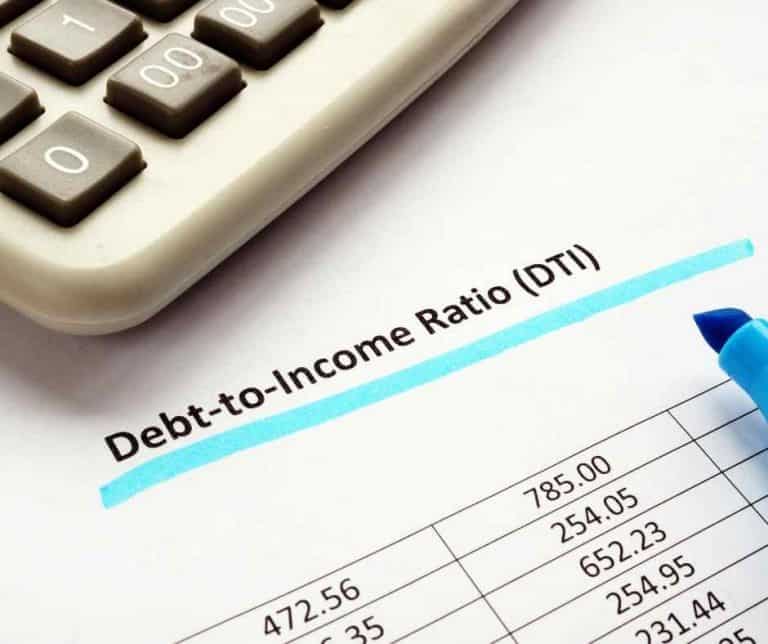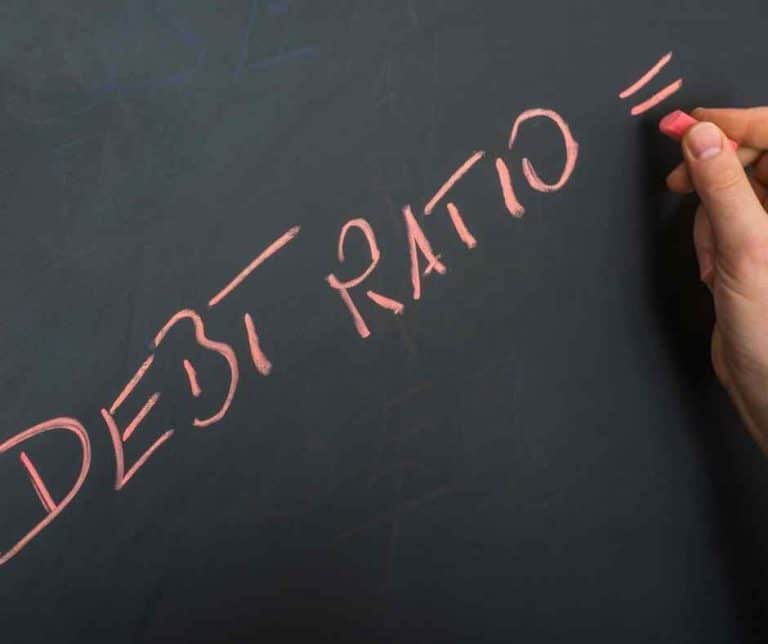Free Debt Consolidation
No contact details required to find out if you qualify
Due to the effects of the COVID-19 Pandemic, the debt-to-income ratio in Canadian households has been on the rise since 2020.
As individuals, the debt-to-income ratio is as important as your credit score as it tells you how affordable your debt repayment is. This ratio will tell you if you are comfortable in repaying your debt or you have too much debt to pay.
Know more about us and what we can do by clicking on the button below…
1 day 3 days 3 days 8 days 7 days 6 days 12 days 9 days 3 days 6 days 1 day 4 days 2 days 1 day 7 days 5 days 8 days 6 days 12 days 16 days 5 days 8 days 2 days 7 days ago in debt in
In this blog, you will learn how to calculate and find out if you have too much debt to handle.


To calculate your debt-to-income ratio, sum up all your monthly debt obligations and divide the total by your monthly gross income/salary. Now, to convert the value to percentage, multiply the figure by 100.
Take note to include all your income sources such as your spouse’s salary, Child Tax Benefit, pension, and other sources of funds. For total monthly debt payments, total your minimum monthly payments on credit cards, car payments, loans, bills, and other monthly obligations.
Formula:
DTI = Total Monthly Debt Payments ÷ monthly gross income x 100
Example:
DTI = $2,200.00 ÷ $4,500.00 x 100
DTI = 49%

Many Canadians carry a lot of debt, especially from credit cards or lines of credit that only require you to pay minimum payments every month. You must know that minimum payments won’t help you pay off your debt. This is a way for banks to keep you as a customer and keep you in debt.
Below are examples and what your DTI is telling you.
30% or Less
This is a good ratio. It means you are in good financial shape, and you can save money because your debt is a lot less compared to average individuals. Keep track of your budget to maintain this ratio.
31% to 41%
This is the maximum range of acceptable ratio. Meaning you are at the edge of falling into a debt trap. Start working on your debt now before your debt interests get uncontrollable. If you are only making minimum payments each month, start paying more next month. This will help you pay off your credit card debt faster and improve your DTI Ratio fast.
42% to 50%
You need to be concerned about your finances at this stage. Any slight changes in your income can put you in a danger zone. You may not have the capacity to make payments more than the minimum because of the percentage of the debt you are paying versus your gross income.
Above 50%
This is a dangerous range to be in. This means your debt repayment is taking up more than 50% of your monthly income. It indicates that you are experiencing a debt problem. This is not the time to procrastinate and wait for it to get even worse. Talk to our debt specialists by clicking the below button to learn more about your debt relief options immediately.

Aside from looking at your credit rating, lenders will look into your debt-to-income ratio to assess the risks of lending you money. Credit scores are used to review your borrowing profile and payment history while the debt-to-income ratio helps banks to gauge your capacity to afford a higher monthly payment when taking a new loan or credit line.
If you are applying for a housing loan, a mortgage lender will look into your debt-to-income ratio. Most lenders recommend that your DTI ratio don’t exceed 35%.
It is normal for people to experience unexpected life events such as getting laid off from work, medical expenses, divorce, or loss in the family. Experiencing these life events that happen unexpectedly could potentially stretch out your finances and eventually affect your debt payments. Unexpected life events when combined with high debt-to-income levels are the most common causes of getting insolvent.
A lower ratio means you’ll have more income going towards your savings. This will help you build an emergency fund that you can use if needed.

If you feel you are running out of options and you are stuck in debt, you are not alone. We can help lower your debt-to-income ratio through our government-approved debt relief programs.
Our debt relief programs are an amazing way of helping Canadians eliminate up to 75% of unsecured debts in just 5-7 days. You are eligible to take advantage of this debt relief program if you owe more than $10,000 debt and consolidate Credit Card Debt, Personal Loans, Car Loans, Taxes, CERB, HST, 407, Household Bills, Payday Loans, and Student Loan.



To know more what you can benefit from our Ontario Debt Relief Program, simply try our Debt Consolidation Calculator below and one of our debt specialists will get in touch with you and provide you the best debt relief option that fits your situation.
No contact details required to find out if you qualify
We will help you reduce as much as 75% of your debts and consolidate it into a single affordable monthly payment. Your creditors will stop harassing you and all interest will freeze if you get into our Ontario Government Debt Relief Program.
Many Ontarians are already benefiting from our Debt Relief Program, YOU should too!
Find out how much you can write off portion of your debts by getting your Free Savings Estimate below. A debt specialist from National Debt Relief Services in Ontario will discuss all options and provide you tailor-fitted Debt Relief Program.
SEE IF YOU QUALIFY TO:
No contact details required to find out if you qualify
A Debt Consolidation is a negotiated debt settlement offer made between you and your creditors with the help of a Debt Relief Agency in Ontario. Some key benefits of Debt Consolidation are interest-free program, no upfront fee required, combined monthly payment into one affordable amount, no lawsuits, and many more.
Yes, your assets are safe from creditors. A licensed debt relief agency in Ontario will help you come up with an offer to your creditors that will make sure your assets will be out of the paper.
No, in fact, this is one of the great advantages of a Debt Consolidation Program. All wage garnishment will stop from the day you filed the proposal.
The effect on your credit score is not going to be severe. Your credit score will most probably go to R7 Rating and will remain in your credit report for another 3 years after you completed the program. This means that it will not be permanent and you will still be able to rebuild your credit score.
This varies depending on the proposal you will be discussing with the help of a certified debt relief agency. It is also worth noting that debt consolidation cannot exceed more than 5 years.
If a debt is shared, you need to file a joint debt consolidation offer to your creditors. However, in most cases, in which the debts are individually incurred will have no impact on your spouse.
After three missed payments, your debt arrangement with creditors will be broken and you will end up getting chased again for the original debt amount plus interest.
A debt consolidation offer can be paid off earlier if you can. In this way, you receive your “Certificate of Completion” sooner and you can immediately start rebuilding your credit score.
National Debt Relief Services Ontariois a certified Canadian Debt Relief Agency that offers FREE CONSULTATION to your debt consolidation needs. We value the trust given to us by our clients by making sure your personal information is confidential and private. Our personalized plans are designed to tailor fit your financial capacity. Our specialists will get in touch with you by simply answering a few questions thru the link provided below.


Proud to support financial literacy education
Get a free savings estimate today. There is no obligation.
Copyright © 2019-2024. NationalDebtRelief.ca. All Rights Reserved
100% Canadian Owned & Operated.
*Disclaimer – NationalDebtRelief.ca, is a debt settlement company; not a credit repair or consumer credit counseling company. NDRS doesn’t provide investment, tax or legal advice. NDRS does not provide services or assistance repairing, modifying, improving, or correcting credit entries or credit reporting. NDRS does not assume or pay any debts, receive, hold or control funds belonging to consumers. NDRS’s debt settlement program and advice program is not available in all provinces across Canada. Individual results vary and are dependent on factors such as successful completion of program, creditor cooperation, and ability to save funds by consumer to settle. Read and understand all contract terms and program disclosures before enrolling. Not all clients successfully complete the debt settlement program. We will educate you on how to create a new financial life.